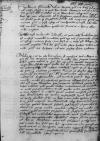Letter #334
Ioannes DANTISCUS to [Iustus Lodvicus DECIUS (DECJUSZ, DIETZ)?]Valladolid, 1527-05-01
Manuscript sources:
Auxiliary sources:
Prints:
| ||||||||||||||
Text & apparatus & commentary Plain text Text & commentary Text & apparatus Excerpts concerning Dantiscus' travels
Salutem et felicitatem.
Ab eo tempore, quo me
Quod adversa valetudine laborasti, non potui tibi non condolere; ista est misera mortalium condicio, quam ego etiam superioribus diebus non effugi, arthriticus factus, sine tamen - ut in trito est adagio - fortunarum accessione, licet Deo gratias mihi satis habere videor, modo mihi post tot labores ad vos sospes detur reditus.
Nolui ego, ut tu, uti Laconismo, se<d> copiosius tecum colloqui, a quo tamen me temporis angustia et multa alia scriptio avocat; dabis igitur veniam et quae hic aguntur , accipies in compendio. Obsides regis Galliae hic bene tractantur, sed de illorum redemptione niladhuc intellegimus. Coeptum fuit hic agi de pace per oratores pontificis, Franciae et Angliae regum, Florentinorum, Venetorum, qui dum videbantur deficere in m[a]ndatis non sufficientibus, nihil concludi potuit. Rex Gallorum omnibus modis se continet, ut pecunias colligat. Id quod factum est circa Neapolim per triremes Gallicas, puto te non latere, videlicet quomodo portum ibidem intraverint et castellum in mari expugnaverint, unde postea inter pontificem et viceregem 8 mensium sunt indutiae confectae, ad quas dux Burbonensis non fertur consensisse. Quid hinc futurum, exitus docebit.
